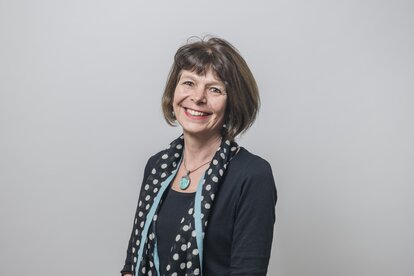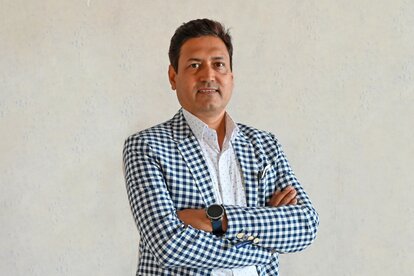You can see Lapha village from the road – a cluster of traditional two storey mud-washed houses on the other side of the valley, nestled amongst a profusion of fodder and fruit trees. This is somewhat unusual in a landscape of more scattered rural homes, only concentrated into settlements along roadsides. Lapha is a Magar village, Magars being one of the 120 or so ethno-linguistic groups of Nepal. At 7.1% of the population in the last census (in 2011), they are amongst the most numerous - although now spread quite widely across the country from their Western origins. Here in Dullu municipality (Dailekh), they are a small minority, proud of their own culture and traditions. According to the chair of Lapha Community Homestay, Krishna Thapa Magar, this is the most important factor behind the homestay concept: reinforcing their sense of community. “The homestay is a way of keeping everyone in the village together, of showing Magar culture to others.”

A community rather than a private homestay
Homestays are a growing form of tourism in Nepal, one that, in the “Visit Nepal 2020 campaign” the government is keen to foster. Usually, however, the concept comprises individual households offering tourist accommodation, rather than a whole village. The Lapha Community Homestay began in 2017, with nine families putting aside at least one room in their house for visitors; this has now expanded to 15 families, meaning that the village can accommodate up to 30 visitors at a time. The original group formed a committee, which approached Dullu municipality for support. At the time, local elections had just taken place; the municipality was establishing itself and already saw tourism as a potential way to boost the local economy. They hoped to attract visitors to various locally renowned sites, especially “flame temples” built around points where natural gas escapes from bedrock and burns as a low flame.
The municipality contributed towards the construction of a small community meeting hall in Lapha where guests could be served food under one roof and be entertained by traditional Magar songs and dance.
WASH (Water, Sanitation and Hygiene) tourism….
The first homes in which guests were lodged all had an outside toilet, but not all households could offer this facility. This was a clear limitation to the number of people who could be accommodated. Safe drinking water and hygiene behaviors were other limitations. The village water supply was old and poorly functioning, and during the season of water scarcity, women had to walk over 30 minutes (round trip) to collect water from the nearest source. Dullu municipality identified Lapha as a priority for a new drinking water scheme – and sought Helvetas support for its construction. It was at this point that the idea of WASH tourism was born.
From time to time, Helvetas is approached by donors who wish to see at first hand the development activities that they have funded. Some specifically ask for a “village experience”. This is not as easy to arrange as might be thought – but in Lapha, the WASH team saw real potential: combining a village stay with observing the practicalities of installing rural water supply systems. As a result of this scheme, every household in Lapha and an adjoining village – 28 in total - now has a private tap stand supplying safe and affordable water all year round.
Group visits
The sanitation company Geberit has a long partnership with Helvetas, supporting water and sanitation activities in several countries, including Nepal. In recent years, the company has sought to foster employee awareness of this element of their corporate social responsibility policy by offering a group field visit to Nepal to a select number of employees – who pay part of the cost themselves. Three such visits have now taken place; the most recent, last year, was to Lapha, as documented in an online video. The group spent a week in Lapha, and worked alongside the villagers, digging a trench for the new water supply. This proved to be an experience valued by all concerned – the visitors, the villagers, and project staff.
The infrastructure installed with the help of the Geberit volunteers was in fact funded by another partner of Helvetas, Viva con Agua. Members of this organization have also stayed in Lapha, and the community is hopeful of attracting further group visits. To this end, they have managed to obtain funding from the provincial government to concrete over the once slippery, muddy steep main path running through the village, and to build a new and larger community hall. This was a fitting venue for a recent workshop organized by Helvetas that brought together elected representatives from seven municipalities in Karnali province to share and discuss their more innovative ideas and approaches. Dullu municipality could highlight the community homestay as one example of a good practice that can be replicated elsewhere.

Open for business
Lapha residents host individuals as well as groups. They can offer an authentic traditional village experience, with simple accommodation and excellent local food. Those wanting a hot shower and Western toilet will be disappointed, although plans for shower facilities are afoot. What can be guaranteed is that all households offering rooms fulfill the five standard indicators of what is known as total sanitation. That is: having and using a (squat, outdoor) toilet; washing the hands regularly; preparing food safely (including drying washed cooking utensils on an outdoor rack); keeping the house clean; and disposing of waste responsibly (organic matter for compost and other litter for burning). To this may be added keeping the wider environment clean – evidence of which are regularly emptied bamboo litter baskets dotting the village.

The price of an overnight stay and food is very cheap, even by local standards (roughly 5 USD for full board and lodging). Given that it is the women who do most of the work of cooking and cleaning, is it worth it for them? All those we asked assured us that they enjoy having visitors, and, like Krishna Thapa Magar, stressed their pride in show-casing their community. Laughing and gossiping as they work, and never slow to smile, they certainly gave the impression of being enthusiastic hosts.



